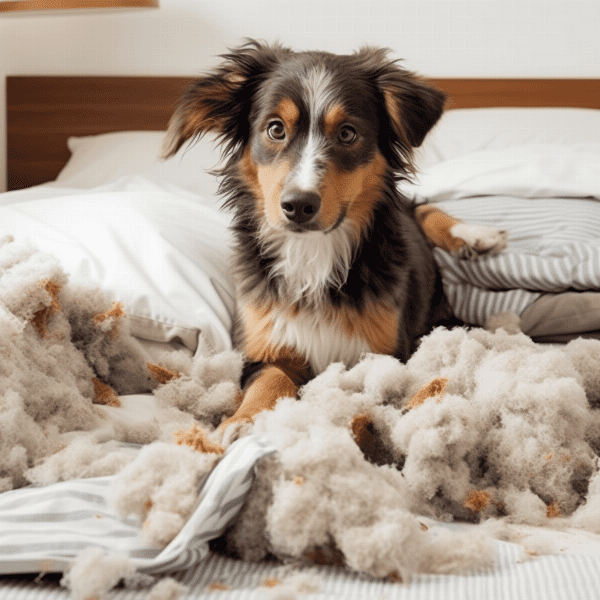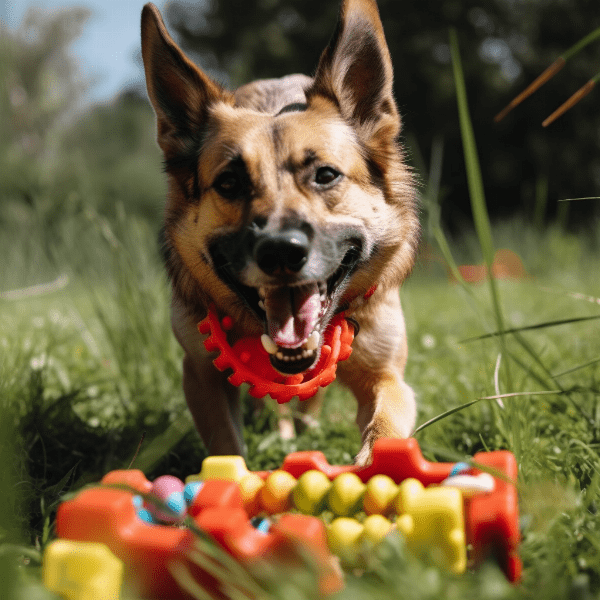Table of Contents
- Why do Dogs Dig in Bed?
- Provide a Comfortable Bed for Your Dog
- Train Your Dog to Use Its Bed
- Provide Enough Exercise and Mental Stimulation
- Avoid Punishing Your Dog
- Consider Using Positive Reinforcement
- Use Deterrents to Stop Digging
- Seek Professional Help If Necessary
- Be Patient and Consistent
- Enjoy a Peaceful Night’s Sleep with Your Dog
Why do Dogs Dig in Bed?
Dogs are known for their instinctual behaviors, and digging is one of them. Digging in bed is a common behavior that dogs exhibit, and there are several reasons why they do so. In this section, we will explore the reasons why your dog digs in bed and what you can do about it.
Their Ancestral Instincts
Dogs are descendants of wolves, and in the wild, wolves often dig holes to create a comfortable and safe den for themselves and their pack. This instinct to dig is still present in domestic dogs, and they may dig in their bed to create a comfortable spot to rest.
Seeking Comfort
Dogs may also dig in their bed to find a comfortable position to sleep in. They may be trying to adjust the bedding or create a little nest for themselves. This behavior is more common in dogs that have not been provided with a comfortable and supportive bed.
Anxiety and Stress
Another reason why dogs may dig in bed is anxiety or stress. If your dog is anxious or stressed, they may dig in their bed as a coping mechanism. This behavior may be accompanied by other signs of anxiety, such as pacing or excessive barking.
Boredom
Dogs that are bored may also dig in their bed. This behavior may be a way for them to expend energy or alleviate boredom. It is important to provide your dog with enough physical and mental stimulation to prevent them from becoming bored.
Health Issues
In some cases, digging in bed may be a sign of an underlying health issue. If your Dog is digging excessively, it is important to take them to the vet for a checkup to rule out any medical problems.
Understanding why your Dog is digging in bed is the first step towards addressing this behavior. By identifying the underlying cause, you can take steps to prevent your dog from digging in bed and provide them with a comfortable and peaceful place to rest.

Provide a Comfortable Bed for Your Dog
One way to prevent your dog from digging in bed is to provide them with a comfortable and supportive bed. Here are some tips to ensure that your dog’s bed is comfortable:
Choose the Right Size
Dogs come in all shapes and sizes, and it is important to choose a bed that is the right size for your dog. A bed that is too small can be uncomfortable and may cause your dog to dig or scratch at it to make it more comfortable.
Consider the Type of Bed
There are many types of beds available for dogs, including orthopedic beds, bolster beds, and nest beds. The type of bed you choose will depend on your dog’s individual needs and preferences. Orthopedic beds are ideal for dogs with joint pain or arthritis, while bolster beds provide additional support for dogs that like to rest their head on a pillow.
Choose the Right Material
The material of the bed is also important. Choose a bed made of high-quality materials that are durable and easy to clean. Beds with removable covers make cleaning easier and help to prevent odors and bacteria from building up.
Provide Adequate Cushioning
Make sure your dog’s bed has adequate cushioning to provide support and comfort. Beds with memory foam or other supportive materials can help to alleviate joint pain and provide extra comfort for your dog.
Consider the Location of the Bed
The location of your dog’s bed is also important. Place the bed in a quiet and comfortable area where your dog can relax without being disturbed. Avoid placing the bed in a high-traffic area or near noisy appliances that may disturb your dog’s sleep.
By providing your dog with a comfortable and supportive bed, you can prevent them from digging in bed and ensure that they get a good night’s sleep. Consider your dog’s individual needs and preferences when choosing a bed and make sure it is located in a quiet and comfortable area of your home.

Train Your Dog to Use Its Bed
Training your dog to use its bed is an effective way to prevent them from digging in bed. Here are some tips to help you train your dog to use its bed:
Start with Positive Reinforcement
When you first introduce your dog to their new bed, use positive reinforcement to encourage them to use it. Place treats or toys on the bed to make it a positive and rewarding experience for your dog.
Encourage Your Dog to Relax
Encourage your dog to relax on their bed by providing them with a comfortable and supportive bed, as discussed in the previous section. You can also use calming scents, such as lavender, to help your dog relax.
Use Verbal Cues
Use verbal cues to encourage your dog to use their bed. Say “bed” or “go to bed” when you want your dog to use their bed. Be consistent with your cues to help your dog understand what you want them to do.
Be Patient and Consistent
Training your dog to use their bed may take time and patience. Be consistent with your training and reward good behavior. Avoid punishing your dog if they do not use their bed, as this can be confusing and counterproductive.
Use Crate Training
If your dog is still having trouble using their bed, consider crate training. A crate can provide a comfortable and secure space for your dog to rest, and can help to prevent them from digging in bed.
By training your dog to use their bed, you can prevent them from digging in bed and ensure that they get a good night’s sleep. Use positive reinforcement, verbal cues, and rewards to encourage your dog to use their bed, and be patient and consistent with your training.

Provide Enough Exercise and Mental Stimulation
Dogs that are bored or have excess energy may dig in bed as a way to alleviate their boredom. Providing your dog with enough exercise and mental stimulation can help to prevent this behavior. Here are some tips to help you provide your dog with enough exercise and mental stimulation:
Go for Walks
Going for walks is a great way to provide your dog with exercise and mental stimulation. It allows them to explore their environment, interact with other dogs and people, and get the physical activity they need.
Play with Your Dog
Playing with your dog is another great way to provide them with exercise and mental stimulation. You can play fetch, tug-of-war, or hide and seek to keep your dog engaged and active.
Provide Puzzle Toys
Puzzle toys are a great way to provide your dog with mental stimulation. These toys require your dog to use their problem-solving skills to access treats or toys inside.
Teach Your Dog New Tricks
Teaching your dog new tricks is a great way to provide them with mental stimulation. It challenges their brain and keeps them engaged and active.
Consider Doggy Daycare
If you are unable to provide your dog with enough exercise and mental stimulation on your own, consider taking them to doggy daycare. Doggy daycare provides your dog with socialization, exercise, and mental stimulation in a safe and supervised environment.

Avoid Punishing Your Dog
Punishing your dog for digging in bed is not an effective way to address this behavior. In fact, punishment can actually make the behavior worse and damage the bond between you and your dog. Here are some reasons why you should avoid punishing your dog for digging in bed:
It is Ineffective
Punishing your dog for digging in bed is ineffective because it does not address the underlying cause of the behavior. It may stop your dog from digging temporarily, but it will not prevent them from doing it again in the future.
It Causes Anxiety and Stress
Punishing your dog can cause anxiety and stress, which can make the digging behavior worse. Dogs that are punished may become fearful and anxious, which can lead to destructive behavior and other unwanted behaviors.
It Damages the Bond between You and Your Dog
Punishing your dog can damage the bond between you and your dog. Dogs that are punished may become fearful or aggressive towards their owners, which can lead to a breakdown in the relationship between you and your dog.
It Teaches Your Dog to Fear You
Punishing your dog can teach them to fear you, which can lead to other problems in the future. Dogs that fear their owners may become anxious or aggressive, and may be more likely to engage in unwanted behaviors.
Instead of punishing your dog for digging in bed, focus on positive reinforcement and training. Use verbal cues, rewards, and other positive methods to encourage your dog to use their bed and to prevent them from digging in bed. By using positive methods, you can build a stronger bond with your dog and ensure that they are happy and well-behaved.

Consider Using Positive Reinforcement
Positive reinforcement is a highly effective way to encourage good behavior in dogs. By using positive reinforcement, you can encourage your dog to use their bed and prevent them from digging in bed. Here are some tips for using positive reinforcement:
Be Consistent
Consistency is key when using positive reinforcement. Be consistent with your rewards and praise to help your dog understand what you want them to do. This will help to reinforce the behavior and encourage your dog to use their bed in the future.
Avoid Punishment
As mentioned earlier, punishment is not an effective way to encourage good behavior in dogs. Avoid punishing your dog for digging in bed, as it can be counterproductive and damaging to your relationship with your dog.
Use Clicker Training
Clicker training is a highly effective way to use positive reinforcement. It involves using a clicker to make a sound when your dog performs a desired behavior, followed by a treat or toy as a reward. This helps to reinforce the behavior and encourages your dog to repeat it in the future.
Using positive reinforcement is a highly effective way to encourage good behavior in dogs. Use verbal praise, offer treats or toys, be consistent, avoid punishment, and consider using clicker training to encourage your dog to use their bed and prevent them from digging in bed.

Use Deterrents to Stop Digging
Use Double-Sided Tape
Double-sided tape can be an effective deterrent for dogs that dig in bed. Simply place the tape on the bed where your dog likes to dig. The sticky surface will be uncomfortable for your dog, and they will likely avoid digging in that spot in the future.
Provide an Alternative
Providing your dog with an alternative to digging in bed can also be effective. Give your dog a designated digging area, such as a sandbox or a designated area in your yard. Encourage your dog to dig in that area and praise them when they use it.
Use a Spray Deterrent
Spray deterrents can also be effective in stopping digging behavior. There are many types of spray deterrents available, including bitter apple spray, citrus spray, and vinegar spray. These sprays are safe for dogs and can help to discourage digging behavior.
Use Noise Deterrents
Noise deterrents can also be effective in stopping digging behavior. You can use a can filled with coins or a loud noise-making device to startle your dog when they begin to dig. This can help to break the behavior and discourage them from digging in the future.
Use a Cover
Finally, using a cover on your dog’s bed can also be effective in stopping digging behavior. A cover will make it more difficult for your dog to dig and may discourage the behavior.
By using deterrents, you can prevent your dog from digging in bed and ensure that they get a good night’s sleep. Use double-sided tape, provide an alternative, use a spray or noise deterrent, use a cover, or a combination of these methods to stop your dog from digging in bed.

Seek Professional Help If Necessary
If your dog’s digging behavior persists despite your best efforts to prevent it, you may need to seek professional help. Here are some reasons why seeking professional help may be necessary:
Underlying Medical Issues
Underlying medical issues can sometimes cause dogs to dig in bed. If your dog’s behavior is unusual or sudden, it may be a sign of an underlying medical issue. A veterinarian can help to rule out any medical causes for the behavior.
Behavioral Issues
Digging in bed can also be a sign of behavioral issues, such as anxiety or boredom. A professional dog trainer or behaviorist can help to identify the underlying cause of the behavior and develop a plan to address it.
Training Challenges
Sometimes, training your dog to stop digging in bed can be challenging. A professional dog trainer or behaviorist can provide additional support and guidance to help you effectively train your dog.
Safety Concerns
If your dog’s digging behavior is causing safety concerns, such as damaging furniture or creating a tripping hazard, it may be necessary to seek professional help to prevent the behavior.
By seeking professional help, you can ensure that your dog’s digging behavior is effectively addressed and that they get the help they need. A veterinarian, dog trainer, or behaviorist can provide valuable insight and support in addressing your dog’s digging behavior.

Be Patient and Consistent
Training your dog to stop digging in bed can take time and patience. Here are some reasons why it’s important to be patient and consistent:
Dogs Need Time to Learn
Dogs need time to learn new behaviors and habits. It may take several weeks or even months for your dog to stop digging in bed. Be patient and consistent with your training, and don’t give up if you don’t see immediate results.
Consistency is Key
Consistency is key when training your dog. Use the same verbal cues, rewards, and other training methods every time you train your dog. This will help your dog to understand what you want them to do and reinforce good behavior.
Punishment is Counterproductive
As mentioned earlier, punishing your dog for digging in bed is counterproductive and can make the behavior worse. Be patient and consistent with positive reinforcement and other training methods, and avoid punishing your dog for digging in bed.
Celebrate Small Victories
Celebrate small victories with your dog. When your dog uses their bed without digging, praise them and give them a treat or toy. This will help to reinforce the behavior and encourage your dog to use their bed in the future.
Stay Positive
Finally, stay positive when training your dog. Dogs respond well to positive reinforcement and encouragement. Stay patient and consistent, and avoid getting frustrated or angry with your dog.
By being patient and consistent, you can effectively train your dog to stop digging in bed. Dogs need time to learn, so be patient and consistent with your training. Celebrate small victories, stay positive, and avoid punishment. With time and effort, you can help your dog to develop good habits and behaviors.

Enjoy a Peaceful Night’s Sleep with Your Dog
If your dog has been digging in bed, it can be frustrating for both you and your furry friend. However, with patience, consistency, and the right training methods, you can help your dog to develop good habits and behaviors. Here are some tips to help you enjoy a peaceful night’s sleep with your dog:
Provide a Comfortable Bed
Providing a comfortable bed for your dog is key to preventing digging behavior. Choose a bed that is the right size for your dog and is made from comfortable materials. Consider adding a blanket or pillow for extra comfort.
Train Your Dog to Use Their Bed
Training your dog to use their bed is another key step in preventing digging behavior. Use positive reinforcement, verbal cues, and other training methods to encourage your dog to use their bed.
Provide Enough Exercise and Mental Stimulation
Providing your dog with enough exercise and mental stimulation can also help to prevent digging behavior. Go for walks, play with your dog, provide puzzle toys, teach them new tricks, and consider doggy daycare if necessary.
Use Deterrents to Stop Digging
If your dog continues to dig in bed despite your best efforts to prevent the behavior, you may need to use deterrents to stop the behavior. Use double-sided tape, provide an alternative, use a spray or noise deterrent, use a cover, or a combination of these methods to stop your dog from digging in bed.
Seek Professional Help if Necessary
If your dog’s digging behavior persists despite your best efforts, you may need to seek professional help. A veterinarian, dog trainer, or behaviorist can provide valuable insight and support in addressing your dog’s digging behavior.
By following these tips, you can help your dog to develop good habits and behaviors and enjoy a peaceful night’s sleep with your furry friend. Provide a comfortable bed, train your dog to use their bed, provide enough exercise and mental stimulation, use deterrents to stop digging, and seek professional help if necessary. With patience, consistency, and the right training methods, you can help your dog to be happy, healthy, and well-behaved.




